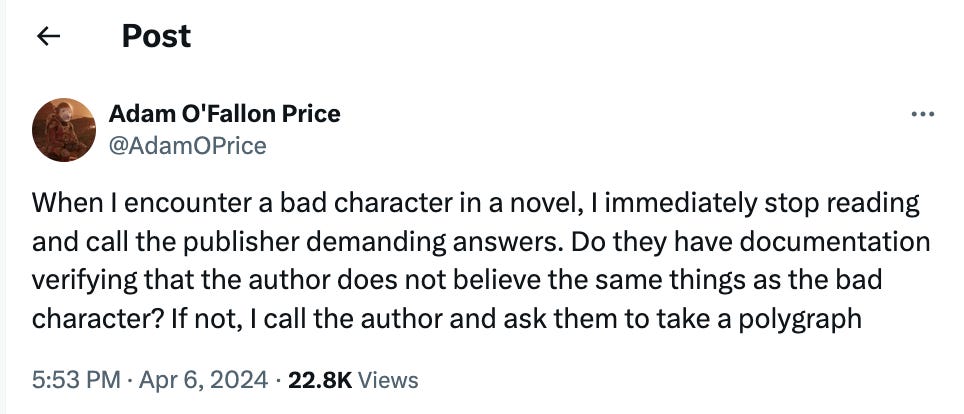228. READ. LOOK. THINK.
This magical mode, a loss of faith in storytelling, baby to baby, unhinged bisexual woman, striking new intel re: Ann Patchett.

READ.
‘Third person is the grammatical mode not only of the speculative experiment of omniscience, but in some sense of fictionality itself. This is because it constructs counterfactual perspectives across different times and spaces — a perspective that individual experience is naturally incapable of accessing. The third person is also the mode that makes possible free indirect discourse, a way of blending the thought of different minds unique to the novel. Nowhere else can we get to think collectively shared thoughts (that’s what makes them “free”; they are no one’s property). It is this very third person, this magical mode, which seems to be dying out’.
‘I’m starting to think that the Sebaldian turn in contemporary literature, which people keep trying to justify as a loss of faith in storytelling convention, in its falseness or whatever, really just reflects the feeling that their lives have been determined by forces outside their scope. The effort of imagining a person sufficiently free to exercise agency within a traditional plot is beyond their powers to such an extent that they’ve resorted to dramatising the act of imagination itself.’
‘One of [the] interviewees explained that her husband was annoyed when she read novels in his company because he wanted her to be fully there in the room with him, even if he was watching sports on TV.’
‘Winnicott’s elegant white suit was crumpled; so was his handsome face. He reminded me of a very frail Spencer Tracy. His sentences were not always coherent but I experienced them as direct communications to an incredibly primitive part of myself; I want to say that we spoke to one another baby to baby.’
‘… in a writer, over-sanity can be hard to take.’
‘Making a beautiful home, making it yours and making it welcoming and peaceful at last, is one of the hostages to fortune that the child of difficult parents may hold against the future.’
The ‘unhinged bisexual woman’ novel.
I loved Rural Hours by Harriet Baker, on the country lives of Virginia Woolf, Sylvia Townsend Warner and Rosamond Lehmann.
I can’t wait for All Fours, American friends who have a copy are universally saying, almost worryingly, that it’s life-changing.
Sorry — what? Ann Patchett wrote the whole of Tom Lake on a treadmill.
LOOK.

‘She’s got this Google folder on her phone with like 1400 photos of me when I was younger.’
A great list of very, very easy meals.
Podcast eps: Why we make others feel bad! On envy! Helen Garner! Taylor Swift Derangement Syndrome.
Little Simz Irish dancing at a gallery opening.
THINK.
‘Any argument in which two people remember the same thing in different ways can feel like a terrible game of chicken: the “winner” of the argument is the one less willing to doubt their own memories—arguably the more flawed moral position—whereas the one who swerves first looks weaker but is often driven by a more conscientious commitment to self-doubt.’
‘Covering British politics during this period has been like trying to remember, and explain, a very convoluted and ultimately boring dream. If you really concentrate, you can recall a lot of the details, but that doesn’t lead you closer to any meaning.’
‘What is the most that a working-class person could hope for from a net-zero future? At present, in the vision being broadly promoted, it’s the same hard work, the same exploitation, but with a heat pump instead of a gas boiler.’
Two nights of broken sleep can make people feel years older.
Jess X



